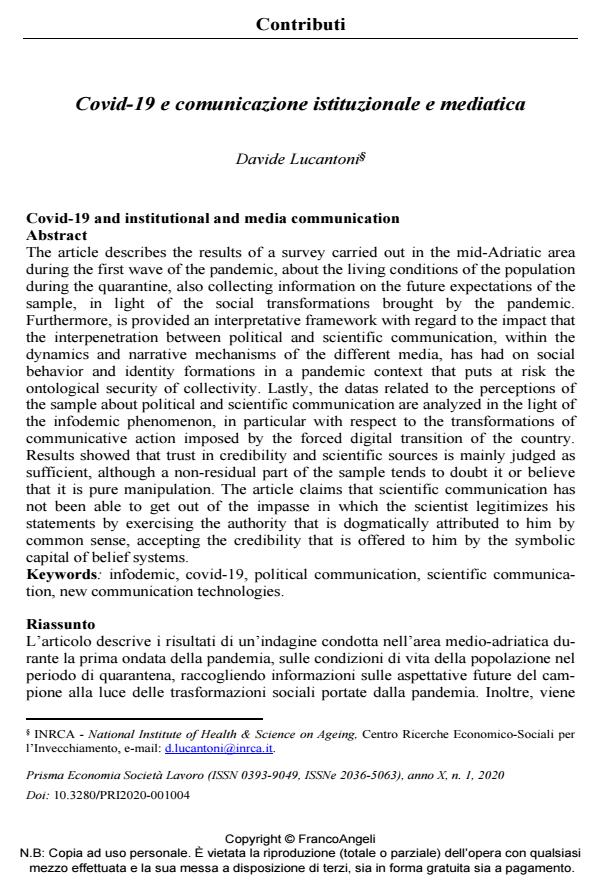Covid-19 and institutional and media communication
Journal title PRISMA Economia - Società - Lavoro
Author/s Davide Lucantoni
Publishing Year 2021 Issue 2020/1
Language Italian Pages 16 P. 43-58 File size 253 KB
DOI 10.3280/PRI2020-001004
DOI is like a bar code for intellectual property: to have more infomation
click here
Below, you can see the article first page
If you want to buy this article in PDF format, you can do it, following the instructions to buy download credits

FrancoAngeli is member of Publishers International Linking Association, Inc (PILA), a not-for-profit association which run the CrossRef service enabling links to and from online scholarly content.
The article describes the results of a survey carried out in the mid-Adriatic area during the first wave of the pandemic, about the living conditions of the population during the quarantine, also collecting information on the future expectations of the sample, in light of the social transformations brought by the pandemic. Furthermore, is provided an interpretative framework with regard to the impact that the interpenetration between political and scientific communication, within the dynamics and narrative mechanisms of the different media, has had on social behavior and identity formations in a pandemic context that puts at risk the ontological security of collectivity. Lastly, the datas related to the perceptions of the sample about political and scientific communication are analyzed in the light of the infodemic phenomenon, in particular with respect to the transformations of communicative action imposed by the forced digital transition of the country. Results showed that trust in credibility and scientific sources is mainly judged as sufficient, although a non-residual part of the sample tends to doubt it or believe that it is pure manipulation. The article claims that scientific communication has not been able to get out of the impasse in which the scientist legitimizes his statements by exercising the authority that is dogmatically attributed to him by common sense, accepting the credibility that is offered to him by the symbolic capital of belief systems.
Keywords: infodemic, covid-19, political communication, scientific communica-tion, new communication technologies.
- Intersoggettività interrotta e salute mentale di bambini e adolescenti durante e dopo il Covid-19: i risultati di una ricerca Davide Lucantoni, Francesco Orazi, Federico Sofritti, in PRISMA Economia - Società - Lavoro 1/2023 pp.11
DOI: 10.3280/PRI2022-001002
Davide Lucantoni, Covid-19 e comunicazione istituzionale e mediatica in "PRISMA Economia - Società - Lavoro" 1/2020, pp 43-58, DOI: 10.3280/PRI2020-001004